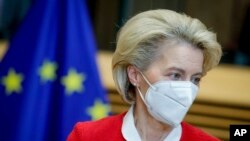The European Union has delivered weapons to Ukraine and slapped punishing sanctions on Moscow in some of its strongest actions against Russia in years. But it is unclear how Brussels will respond to Ukraine’s call for fast-tracked membership to the bloc.
President Volodymyr Zelenskyy’s address to the European Parliament this week brought tears to the eyes of hardened lawmakers. They delivered Ukraine’s leader a standing ovation as he talked about how Ukrainians are fighting for their freedom and very lives.
“But we are fighting also to be equal members of Europe. I believe that today we are showing everybody that’s exactly what we are. The European Union is going to be much stronger with us, that’s for sure.”
It’s just the latest plea from Kyiv to join the 27-member bloc. On Monday, Zelenskyy submitted a formal application for EU membership.
“Ukraine has always wanted to be part of the EU. Very early, on after independence, they moved in that direction. But it’s always been a struggle.”
Amanda Paul is senior analyst at the European Policy Center, a Brussels-based research group.
“But the moment now is very opportune. It’s a serious situation in Ukraine. Ukrainians have shown themselves to be very brave, to be standing up for European security. So I think there will be a strong force from within the EU itself, from many member states to push this thing forward as quick as can be.”
Speaking to Euro News, European Commission chief Ursula von der Leyen echoed the sentiment of a number of EU leaders; saying “over time, they belong to us, they are one of us, and we want them in.”
But some of Ukraine’s biggest champions, mostly eastern and central European states, want to speed up the membership process. EU leaders will reportedly discuss the topic at a summit in Paris next week.
Europe’s older members appear to be more hesitant about delivering a speedy answer.
“Of course, the Ukrainians are European, they proclaim it, they have our values,” France’s foreign minster, Jean Yves Le Drian, said this week. But he suggested, any membership decision would not be immediate.
Ukraine has long aspired to join the bloc. When its former, pro-Russia president Viktor Yanukovych refused to sign a much looser association agreement with Brussels, popular protests in 2014 ousted him. Soon after Russia annexed the Crimea.
Even fast tracked, EU membership can take years. It demands meeting a raft of regulations spanning sectors from the environment to rule of law and finance. There’s already a lineup of other candidates. Some aren’t so sure Ukraine can jump the line.
Adding to potential hesitancy, some of the EU’s newer members like Poland and Hungary have flouted EU standards on key areas like rule of law.
But analyst Amanda Paul believes even offering an affirmative first nod to Ukraine’s future candidacy will make a difference as the Russian invasion stretches on.
“It will definitely be a massive psychological boost for Ukrainians — and this can help them in the conflict as well. Obviously they’re fighting for their country first and foremost, and for themselves. But it will be a very strong signal that the European Union is 101 percent behind them.”
Just as much as delivering guns and planes, she said, it shows Europe is on Ukraine’s side — as a future member of the bloc.






